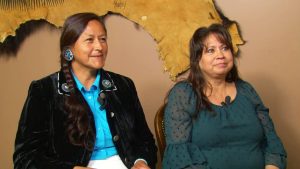OST constitutional reform petition rejected by BIA

Jackie Siers and Valentina Merdanian, members of OST constitutional reform task force.
Photo courtesy of Oyate Today
PINE RIDGE— All across the country many tribes are calling for reform of their respective tribal constitution. This could be because of concerns over corruption, lack of representation, or inadequate or badly conceived laws.
The Oglala Sioux Tribe (OST) is no exception, and the attempts to get constitutional reform continue to struggle against persistent stumbling blocks, ranging from rejected petitions to the BIA, to council votes tabling discussion, and referring the problem back to committee.
On June 17, 2019, in a letter to Caroline New Holy of the OST Constitutional Reform Task Force, the BIA rejected a petition of 4,856 signatures calling for “a secretarial election on proposed amendments to the constitution of the Oglala Sioux Tribe.” The petition had been submitted to the BIA on May 8, 2019.
According to the BIA, 4,094 signatures from eligible OST voters were needed to accept the petition. The petition had 4,856 signatures, more than enough. However, after closer review, the BIA determined 354 of the signatures were from people whose names did not appear on the eligible voter list; 633 signatures were duplicates; five signatures were from minors; 181 signatures were illegible; 41 signatures were from members living off the reservation, and ineligible to vote; and 78 signatures were not popularly notarized, for a total of 1,292 ineligible signatures. Subtracting these signatures from the eligible signatures left the petition 523 signatures shy of the 4,094 required for BIA approval.
“Therefore,” the letter read, “the petition is determined invalid due to lack of valid signatures. A Secretarial election will not be called. This decision is a final agency action on the status of the petition.”
Most tribal governments were formed following the 1934 Indian Reorganization Act, or IRA. Not only did the constitutions reflect the nature, values, policies and sensibilities of the dominant culture, over the course of the next 80 years, those tribal members who best internalized the values and perspectives of the Bureau of Indian Affairs (BIA) themselves, dominated tribal politics and benefited disproportionately, establishing a “hogs-at-the-trough” advantage over those tribal groups and districts which did not have ready access to tribal government and opportunity, for whatever reason. Districts came to be dominated by councilmen who had enough relatives and friends to defeat any opposition. The policies which benefited the cronies of such council members tended to be approved and preferentially applied. Reforming such endemic manipulation and corruption of a system, which was conceived reflecting culturally alien primacies, will be difficult, given the very people whose unfair advantage would be curtailed, even discontinued, have a critical say in whether there will be reform.
Given that underlying problematic nature, it was inevitable that a time would come when constitutional reform became a huge issue. An Indian Law expert, who prefers to be anonymous, told NSNT that one of the mistakes the OST constitutional reform movement made in attempting reform, was to reform too many parts of the constitution, as many as fifty specific changes, when they would have been much better off “concentrating on just three of four.”
Nakina Mills, a task force member, and a council person for Pine Ridge Village, told the Rapid City Journal back in May that one of the main advantages to a Secretarial election was that members could vote on each individual change, instead of approving or rejecting the whole slate.
The task force has not given up, and according to Mills, a meeting has been set up “with an attorney, and at this time there is no comment.”
Wanting to be as transparent as possible, Mills submitted a copy of a letter to NSNT from a concerned tribal member, Cleone Whalen of Pine Ridge Village, who did not support the petition. The BIA told Whalen that, “While the letters do not indicate that these letters were official challenges to the petition, we are treating them as challenges.”
The BIA then said any challenges were moot, as the petition had been declared invalid.
The OST council voted 12-8 to table discussion on constitutional reform back on April 22, and a task force spokesman said they are “still waiting for that opportunity for professional discussion.”
Two of the leading issues in the constitutional reform battle are term expansion and a new He Sapa District, for the Rapid City Oglala Community.
Expanding terms from two years to four years, it is argued, would give council people more time to learn their jobs and work on long term issues. The Rapid City enrolled members have long groused that they have no voice in tribal affairs, and are punished for moving to Rapid City, drawn by better opportunities for employment, education and quality of life. While it is understandable, the Rapid City Oglala Community may not be familiar with specific problems of a specific reservation district, there is no reason they could not participate fully in constitutional reform or vote for reservation wide candidates or on reservation wide issues. A half century back, tribal members living off the reservation, were mailed mail-in ballots and were allowed participation.
Now a waiting game ensues, the task force hoping an attorney can devise a strategy for future appeal, the tribal electorate waiting for whenever, if ever, the tabled issue is opened back up for council discussion, and perhaps even, some sort of action.
(James Giago Davies is an enrolled member of the Oglala Lakota tribe. He can be reached at skindiesel@msn.com)
